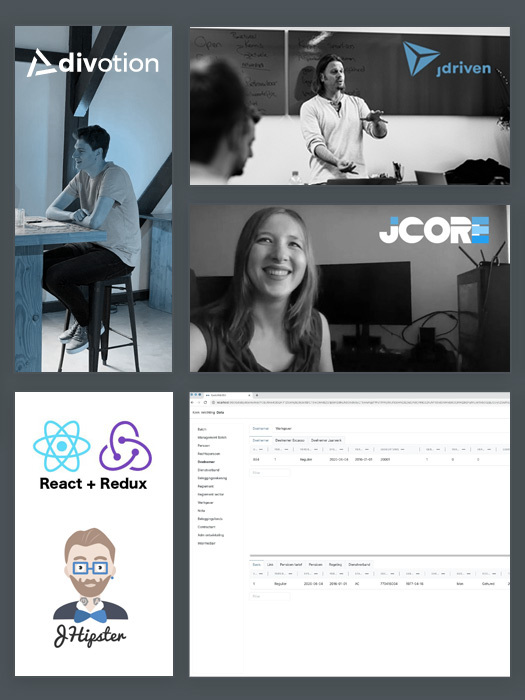Frontmania 2025: When Front End Started Listening
I am a front end developer, someone who has spent years working on interfaces, design systems and accessibility. Frontmania always feels like the place where my two worlds meet. The technical world on one side, the human world on the other. I arrived with the same curiosity as every year, wondering what moves our field and where front end is heading next.
Frontmania 2025 opened at 10:00 with a shared keynote that brought everyone together. The atmosphere was warm, curious and full of good energy. Developers, designers and testers filled the Progress stage, coffee in hand, ready for a full day. The schedule was packed with sessions, workshops and demos, more than anyone could attend. I started with the first talk of the day before the crowd spread across all the rooms.
Why flow matters more than control
At 10:10, Bart Kuijper took the stage with “Why Reactive Functional Is My Paradigm of Choice.”
He compared data streams to rivers and observables to scents drifting through the air. It sounded poetic for a tech conference, yet everyone understood the metaphor immediately.
He showed how patterns like merge, expand and scan reveal the movement of data, almost as if it were alive. His message was simple and calm. Reactive programming is not about control. It is about flow. Let data move naturally through your code.
It was a grounding start, and it shaped the tone of the rest of the day.
A karaoke app without frameworks
After the first break, the rooms filled again for the 11:00 sessions. I chose something playful,
“Building Karaoke in the Browser: Web APIs That Actually Rock,” by Jorrik Klijnsma.
It quickly became one of my favourite sessions. Jorrik showed how much the browser can do on its own. No frameworks. No libraries. Just HTML, Canvas and the Web Audio API.
He walked through sound frequency analysis, timing and drawing perfectly synced lyrics on screen. It was refreshing to see something built directly on web foundations, without layers of abstraction. A reminder that the browser still has incredible power waiting to be used.
Lunch, games and good conversations
Around 12:45, lunch began in the marketplace area. The mood became relaxed and cheerful. People chatted about code, design and the morning talks. Small games and prizes kept the atmosphere light. It felt much more like a reunion than a conference.
From screens to conversations
At 13:45 I returned to the Progress stage for Nir Kaufman’s talk,
“It’s the End of the Front as We Know It (I Feel Fine).”
This was one of the most talked about sessions of the day. Nir explored how interfaces are shifting from clicking to conversing. Large language models can now return more than text. They can send back live React components that render directly inside the chat.
Colour pickers, small forms, interface elements.
He said,
“Between the messages, I can return not text, but a component.”
It felt like watching the future of front end unfold in real time.
When the discussion turns human
At 14:30 I joined the AI panel discussion, which became one of the liveliest sessions of the entire day. It started technical, but it quickly became deeply human.
The moderator asked who uses AI at work. Almost every hand went up. People joked about monorepos so large that Copilot gives up and companies that allow only a single AI tool. But under the humour was a shared sense of realism and honesty.
The conversation shifted to creativity.
“AI makes developers faster, but not less creative,” someone said.
“A brush never made a painter less of an artist.”
That line stayed with me all day.
Trust, checking and responsibility
The panel moved on to trust. The risks of blind trust in AI came up. Lawyers who used AI generated texts with fake citations. Developers who accepted generated code without checking. A test engineer said,
“If the input is correct and the output is correct then maybe the algorithm can stay a black box.”
That felt like a balanced way of describing responsibility. AI can help, but we remain the ones who check.
Faster or better
Someone half joked,
“If AI makes me faster, can I go home earlier?”
The room laughed, but many nodded. Several people admitted they sometimes hide how much time AI saves them to avoid wrong expectations.
Another said,
“AI doesn’t make me faster. It helps me work better.”
That captured it perfectly. Speed is no longer the measure. Quality is.
When technology feels personal
One of the most touching moments came from a developer who shared that she lives with dyslexia. She said AI helps her turn her thoughts into words she can use.
“It gives me a starting point,” she said.
The room softened.
Another developer talked about connecting mail, calendar and Spotify through small automations. On difficult days, the system automatically starts a playlist that helps his mood. It was a tiny story, but it captured something big. Technology that quietly supports daily life.
Privacy, fear and connection
Toward the end, the discussion turned to privacy. Some argued that personal data should stay local on hardware we own. Others said privacy has slowly faded into convenience.
A speaker summarised it beautifully.
“We say we fear AI, but maybe we are afraid to realise how much we already share.”
The room went quiet.
Closing thoughts
Frontmania 2025 was not about tools or frameworks. It was about awareness, responsibility and the human side of technology. Every talk and every conversation circled back to one idea. Technology matters most when it helps us stay human.
Key insights I took home
- The future of front end is shifting from clicking to conversing
- Browsers can do far more than we often use
- Tools do not replace creativity, they amplify it
- Trust and checking remain human responsibilities
- AI saves time but creates space for quality
- Creativity always begins with the human
- Technology is at its best when it softens daily life
- Interfaces should respond to people, not only to data
Front end is not only about systems that react to data. It is about building systems that respond to people. That felt like the true theme running through the entire day.



 Frameworks at Crossroads Europalaan 93, 3526 KP Utrecht
Frameworks at Crossroads Europalaan 93, 3526 KP Utrecht